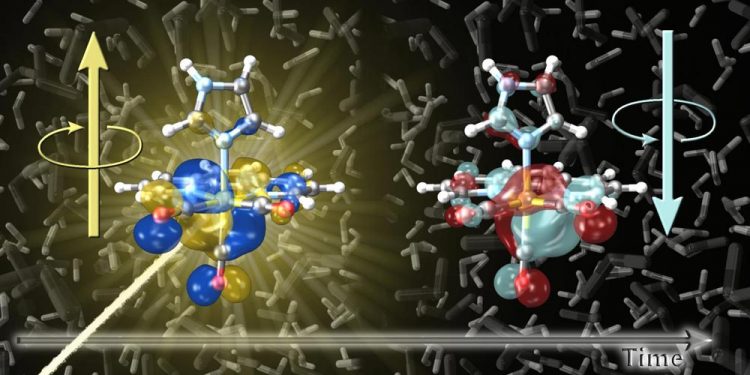The fast dance of electron spins

The extremely fast spin flip processes that are triggered by the light absorption of metal complexes were stimulated in the investigation. Credit: © Sebastian Mai
When a molecule is hit by light, in many cases a so-called “photoinduced” reaction is initiated. This can be thought of as the interplay of electron motion and nuclear motion. First, the absorption of light energetically “excites” the electrons, which for instance can weaken some of the bonds.
Subsequently, the much heavier nuclei start moving. If at a later point in time the nuclei assume a favorable constellation with respect to each other, the electrons can switch from one orbit to another one. Controlled by the physical effect of “spin-orbit coupling” the electron spin can flip in the same moment.
This interplay of motion is the reason why spin-flip processes in molecules typically take quite long. However, computer simulations have shown that this is not the case in some metal complexes.
For example, in the examined rhenium complex the spin-flip process already takes place within ten femtoseconds, even though in this short time the nuclei are virtually stationary–even light moves only three thousandths of a millimeter within this time.
This knowledge is particularly useful for the precise control of electron spins, as, e.g., in quantum computers.
Investigation is based on enormous computer power
One of the biggest difficulties during the investigation was the huge amount of computer power that was required for the simulations. Although for small organic molecules one can nowadays carry out very accurate simulations already with a modest amount of computational effort, metal complexes present a much bigger challenge.
Among other reasons, this is due to the large number of atoms, electrons, and solvent molecules that need to be included in the simulations, but also because the electron spin can only be accurately described with equations from relativity theory.
Altogether, the scientists from the Institute of Theoretical Chemistry spent almost one million computer hours at the Austrian super computer “Vienna Scientific Cluster” in the course of their study. This is equivalent to about 100 years of computer time on a typical personal computer.
###
Publication in Chemical Science: Mai, Sebastian; González, Leticia. Unconventional two-step spin relaxation dynamics of [Re(CO)3(im)(phen)]+ in aqueous solution. Chemical Science 2019. DOI: 10.1039/C9SC03671G
Media Contact
More Information:
http://dx.doi.org/10.1039/C9SC03671GAll latest news from the category: Life Sciences and Chemistry
Articles and reports from the Life Sciences and chemistry area deal with applied and basic research into modern biology, chemistry and human medicine.
Valuable information can be found on a range of life sciences fields including bacteriology, biochemistry, bionics, bioinformatics, biophysics, biotechnology, genetics, geobotany, human biology, marine biology, microbiology, molecular biology, cellular biology, zoology, bioinorganic chemistry, microchemistry and environmental chemistry.
Newest articles

Superradiant atoms could push the boundaries of how precisely time can be measured
Superradiant atoms can help us measure time more precisely than ever. In a new study, researchers from the University of Copenhagen present a new method for measuring the time interval,…

Ion thermoelectric conversion devices for near room temperature
The electrode sheet of the thermoelectric device consists of ionic hydrogel, which is sandwiched between the electrodes to form, and the Prussian blue on the electrode undergoes a redox reaction…

Zap Energy achieves 37-million-degree temperatures in a compact device
New publication reports record electron temperatures for a small-scale, sheared-flow-stabilized Z-pinch fusion device. In the nine decades since humans first produced fusion reactions, only a few fusion technologies have demonstrated…





















